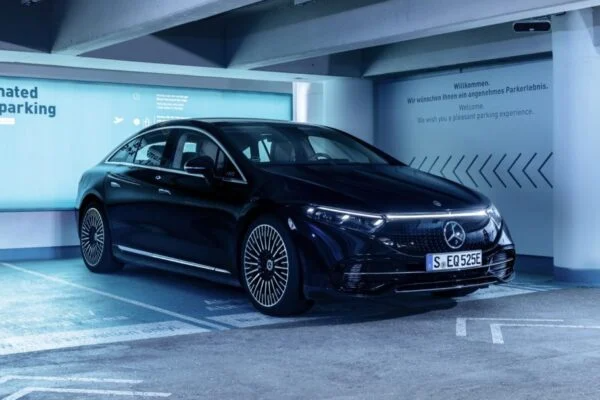Following the series approval of its technology for automated, driverless parking (Automated Valet Parking), Bosch and the parking garage operator APCOA now roll out the technology in commercial operation.
The two companies intend to start expanding the infrastructure-supported, driverless parking system to SAE Level 4 in 2023. Initially, the partners want to equip 15 parking garages in Germany with up to four parking spaces each with their technology. According to Bosch, the system has a modular design and will allow a dynamic expansion of the appropriately upgraded parking spaces to up to 200 parking bays at each of the 15 locations in the coming years.
“In the case of charging points for electric vehicles, we see how important it is that the infrastructure grows in time. That’s what we’re now taking care of with Automated Valet Parking together with our partner APCOA,” says Dr Markus Heyn, Bosch board of management member and chairman of the Mobility Solutions division.
- World’s first driverless public parking system rolls out
- Bosch, Daimler test driverless valet parking via smartphone app
To this end, Bosch and APCOA have concluded a framework agreement. This is only the first step, according to Bosch. The worldwide market launch is planned. In the coming years, the duo wants to be able to offer several hundred car parks Automated Valet Parking (AVP) with Bosch technology.
“Germany is just the beginning – we expect to be able to gradually roll out Automated Valet Parking in other countries around the world soon with the introduction of corresponding legislation,” says Claudia Barthle, who heads global software and service sales in the Cross-Domain Computing Solutions division at Bosch and is responsible for the cooperation with APCOA. So far, Germany is one of the few countries that has created the framework conditions for systems like Automated Valet Parking with Level 4 legislation. Other countries, such as France, are in the starting blocks. The focus is on locations such as airports, concert halls, event locations or trade fair car parks where users have connecting appointments.
Infrastructure and vehicle technology closely dovetailed
The practical procedure of the AVP is simple: the vehicle is parked in a handover zone in the entrance area of a multi-storey car park; the driver then starts the driverless parking service via smartphone app. This is made possible by stereo cameras in the car park, which not only detect free parking spaces, but also the surrounding area and the driving corridor, and thus obstacles or people in the lane. If an obstacle is detected, the vehicle brakes to a standstill and only resumes driving when the lane is clear. For this purpose, the information generated by the cameras converges on edge computers. The trajectory of the vehicle is controlled by software; in this way, driverless parking operation is also to be managed on narrow ramps when changing between different floors. Thanks to the smart technology in the car park, the technical requirements in the vehicle are minimal. According to Bosch, the automated and driverless parking service with Automated Valet Parking, which has initially only been implemented for certain variants of the S-Class and the EQS from Mercedes-Benz with the corresponding pre-equipment, can therefore be rolled out for all vehicle classes in the future.
Thanks to the “FLOW” platform from parking operator APCOA, parking is also completely ticketless and cashless. The app of the same name already takes care of the parking process for drivers. The system recognises the customer’s vehicle by its licence plate number and automatically opens the barriers – a ticket and a trip to the pay station are no longer necessary.
APCOA operates more than 12,000 locations in 13 countries with a total of around 1.8 million parking spaces. With an increasing share of the driverless and fully automated parking service Automated Valet Parking, up to 20 percent more vehicles will fit in the same space in the future. In addition, narrow, remote and therefore less attractive parking areas are particularly suitable for driverless parking.
- Bosch, Daimler get license for Level 4 driverless parking
- Continental drives Automated Valet Parking with AI startup investment
In mid-2017, Bosch and Mercedes-Benz presented the solution as part of a pilot project in the multi-storey car park of the Mercedes-Benz Museum in Stuttgart. Two years later, the partners then received the world’s first exemption for operation without a safety driver with selected vehicles in real mixed car park traffic. Recently, Bosch and Mercedes-Benz received approval from the authorities for series operation in Germany for the AVP system in the P6 multi-storey car park at Stuttgart Airport as the world’s first automated and driverless parking system (SAE Level 4). The APCOA P6 multi-storey car park at Stuttgart Airport is thus the first car park in the world in which the driverless parking system can be used in series operation.



Leave a comment